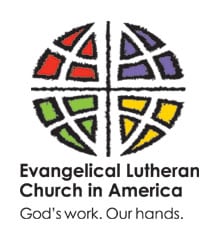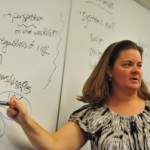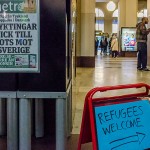 Today I’m heading to Chicago for a meeting of the Theological Roundtable of the Evangelical Lutheran Church in America. This is part of the work of theological discernment carried out by the Office of the Presiding Bishop, including representatives from several networks of scholars and theologians around the country. I’ll be there as a representative of the Lutheran Women in Theological and Religious Studies.
Today I’m heading to Chicago for a meeting of the Theological Roundtable of the Evangelical Lutheran Church in America. This is part of the work of theological discernment carried out by the Office of the Presiding Bishop, including representatives from several networks of scholars and theologians around the country. I’ll be there as a representative of the Lutheran Women in Theological and Religious Studies.
Our focus for the meeting is racial justice and the Black Lives Matter movement. I wrote about Black Lives Matter here and in my local newspaper earlier this year. It was a piece that garnered a lot of not-all-favorable attention from alumni in the region, demonstrating to me that talking about racial justice is more important than ever before.
The ELCA was in a unique situation this summer when it came to light that Dylann Roof, the young white man who assassinated nine black people in a church in Charleston was a member of an ELCA congregation. Presiding Bishop Elizabeth Eaton issued a compelling statement in response to the events, and held a live webcast, Confronting Racism, in August. In addition, the organization of ELCA Young Adults held a Twitter chat on faith, race, and justice in June.
Some of the resources we will be reading and discussing during this two day meeting include:
The Journal of Lutheran Ethics, October 2015 issue, with its focus on Black Lives Matter. I commend to you in particular the article by Rozella White on “The Role of the Church for Such a Time As This” where she states:
“For those who feel like Black Lives Matter is divisive, please know that if all lives truly did matter, we would not see the disproportionate amounts of violence against black and brown bodies along with the ongoing laws that enforce different responses among different communities for the same infractions. Obviously, all lives don’t matter equally in our society. This is a fact.”
The ELCA Social Statement on Race, Ethnicity, and Culture titled “Freed in Christ.” The statement, adopted in 1993, remains relevant with its claim that:
“Racism—a mix of power, privilege, and prejudice—is sin, a violation of God’s intention for humanity. The resulting racial, ethnic, or cultural barriers deny the truth that all people are God’s creatures and, therefore, persons of dignity. Racism fractures and fragments both church and society.”
The ELCA Social Statement on The Church and Criminal Justice, Hearing the Cries. The statement adopted in 2013 points out that:
“Christians are called to confess that we, as individuals and in our common life together, often have fallen short in responding to criminal justice — both in response to crime’s harm and to problems in the justice system.”
We will also be informed by academic work on intersectionality by scholars like Kimberle Williams Crenshaw and Patricia Hill Collins.
The goal? Nothing short of systematically dismantling racism and white privilege, of course. Well, at least that’s my goal. On the way toward achieving that, we might hope to educate and equip ourselves, our neighbors, our students, and our parishioners about the ways that working against structural inequalities is part of the call of the church itself.
Because until we are all free …












